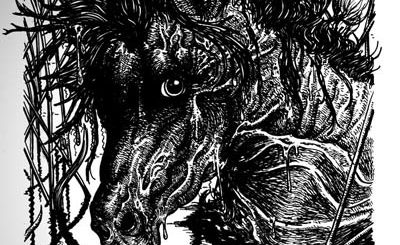Fetching a Halter
The following folk tale entitled ‘Fetching a Halter’ appeared in ‘The Welsh Fairy Book’ (1908) by W. Jenkyn Thomas. ‘A VERY large company came together to hold a merry evening at Bwlch Mwrchan, a farmhouse close by Lake Gwynan, in Snowdonia. It was a stormy night. The wind whistled and howled in the woods, tearing the trees like matchsticks. The night was dark and shreds of heavy clouds floated over the narrow valley, dimly visible and seeming like terrible and ghastly spectres. Lake Gwynan boiled like a boisterous sea, and the spray of its waves was dashed by the wind against the walls and windows of the house.
The weather affected the spirits of the company and gave a melancholy tone to the songs and stories. Disappointed at the turn things had taken, the good man of the house thought he would create a diversion and said, “I will wager that not one of you young men is brave enough to go to the Hafotty, in Cwm Merch, and fetch the halter which I left there.”
Now, the Hafotty was about a mile from the house, and the pathway to it was narrow, rugged, steep, and in every way bad. Not one of the company liked the idea of turning out on such a night, not only on account of the weather, but because of the unearthly terrors which might be encountered. The Gwrach y Rhibyn might well be out on such a night. This hideous hag has red hair as coarse as a horse’s tail, falling down in rough ringlets over her bony shoulders. Her two cheek-bones project like two ridges, and her curved nose almost meets her pointed chin. Her eyes flash fire from their deep sockets, and she appears in front of the pedestrian with long bony arms uplifted, shouting in a cold, shrill voice, “Woe is me, woe is me.” Then is the heart of the bravest melted and his knees smite one against another. The Cwn Annwn, too, the Hounds of Hell, might be heard howling in such a tempest. They are blood-red in colour, and they drip with gore, and their eyes and teeth are of fire. The devil is their huntsman, and they give chase in the air. Their quarry is the souls of evil livers which they hunt to their allotted place of torment. Their cry makes the blood of the hearer freeze in his veins.
It was no wonder, therefore, that the youths present hesitated to accept the challenge of their host. The women-folk, then, began to taunt them with their cowardice. At last, stung by their reproaches, a man from Nant Gwynan said he would sally forth. Against the Hounds of Hell he protected himself by taking with him a cross, for when this is shown to them they fly in the greatest terror. But he saw no one worse than himself, and heard nothing more unearthly than the roar of the wind as he fought his way up. In spite of the storm, the darkness, and the steep winding path, he managed to reach Cwm Merch in safety. When within a short distance of the Hafotty he saw a light within, which was strange, as no one lived there except in the summer, and the place was too outlandish for any stranger to have strayed thither from his way. He went on, not without misgivings, and as he drew near he heard the doleful sound of painful moans. He paused and listened, thinking it might be the wind. But as he went on the moaning became more distinct: a woman was groaning in dreadful pain. He hastened to the door but found it secured from within. He peeped in through some of the cracks, and the sight he saw made gooseflesh come all over him. There was a little woman bound hand and foot, and two men were placing her before a blazing fire to be roasted alive. Stepping back he flung himself upon the door with his whole strength, and sent it spinning into the middle of the Hafotty. Swift as thought he out the woman loose from the bonds that held her. He then looked round for the two men whom he had seen torturing her, but both had disappeared. When the woman had sufficiently recovered he led her down to Bwlch Mwrchan, where he introduced her to the assembled company with the words, “This is the halter I found in the Hafotty.”
At daybreak all went in search of the two monsters. They found their bodies at the foot of a steep cliff, stone cold. The little woman soon recovered from her injuries and married her deliverer. Most of the inhabitants of Nant Gwynan to-day are their descendants.’





Recent Comments